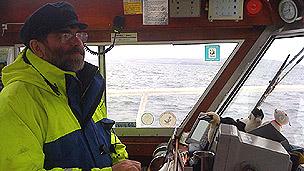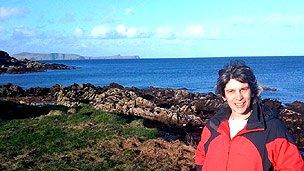Scottish election: Are Shetland the forgotten isles?
- Published

Dr Jonathan Wills: 'We're part of the UK'
Standing in the farmyard on the Dodge family's croft in the hamlet of Cunningsburgh, we look out to sea.
On a late afternoon in mid April, the sky is bright, the sun is high, and the overnight ferry to Aberdeen is trundling along the horizon.
"Next stop Norway, Bergen is just as close!" says Alex Dodge, 43, looking straight out to sea. Alex's family have farmed here for generations.
Her husband feeds the cattle as Shetland ducks scuttle around, in amongst the tractors.
"There are five capital cities closer to here than London," say the Dodges, with a hint of mischievous pride.
Here's the list: Oslo, Copenhagen, The Hague, Dublin and Tórshavn, the capital of the Faroe Islands.
None are that close, but they are all closer than London.
'Distance'
Pretty much everywhere seems a long way off. Even the Orkney Islands sound decidedly southern from here.
With less than a month to go before the elections to the Scottish Parliament, lampposts remain naked, rosette clad politicians low profile.
This is Liberal Democrat heartland country, and has been for generations.
Its political predictability and its isolation mark it out to national commentators as being so far beyond the end of the political track, it is not even worth getting on the boat.

Alex Dodge's family have lived in the Shetlands for generations
But taking the political temperature here is fascinating.
The Lib Dem decision to go into coalition with the Conservatives at Westminster rankles with many, and as election leaflets drop through letterboxes, people are talking politics.
I take a boat trip. The ear catching facts continue. For every human being here, there are ten puffins.
Commanding the controls is Dr Jonathan Wills, a tourist guide here since 1970.
"Things like the cost of freight and the cost of subsidised passenger services on the planes and on the ferries are always going to be local bread and butter issues.
"But I don't buy that we are special because we're an island at all. We're part of the UK and we're an important part of it because of the fisheries, the fossil fuel resources and increasingly the marine resources - the wind and the wave power."
But, he adds: "There is one big issue that is about distance."
'Weather conditions'
This is the government's idea at Westminster to streamline the number of 24 hour coastguard stations around the UK, which could lead to the closure of the station in the islands' capital Lerwick, Britain's most northerly town. There would still be boats here, but they would be deployed from Aberdeen, more than 200 miles away.
"The campaign to stop the closure of the coastguard station here has raised more signatures in a petition than anything else ever seen in these islands," Dr Wills, 63, tells me.
The strength of feeling on the issue is evident everywhere. Campaign posters decorate bus stops, shop windows, hotel lobbies and boats.
When Alex Dodge isn't running the croft with her husband, she is a Watch Officer for the Shetland Coastguard and Chair of the Shetland Coastguard Public and Commercial Services Union.
"We have the local knowledge. We can understand the accent, and know the weather conditions. It's because we live here, and it's so important to understand the environment in this job."
Candidates running for the Scottish Parliament from here fall over themselves to support the cause. And there appears to be plenty of support too for another gripe. The cost of fuel.
One petrol station in Lerwick is charging 153.9p for a litre of diesel. And yet 20 miles up the road is the Sullom Voe oil terminal.
'Shocking'
Jim, a taxi driver parked up at Lerwick Harbour, is angry.
"Diesel is up and so everything else is up," he says.
"And nobody listens to our point. We are across the water. No one cares."
Devolution might bring politics closer to people, but it still seems very distant to Jim.
Across the road, I pop into the Harbour Fish and Chip Shop. Pinned above the menu in the window is a handwritten note. Prices might have gone up, it suggests, because of the cost of fuel.
"It's shocking. I've never seen it this high. No one has any idea what we have to pay," says Yasmin Rasul, 51, who runs the shop.
But Yasmin, like many others I've spoken to here, don't easily dismiss the Scottish Parliament.
Distance doesn't appear to breed indifference, just a desire that their elected representatives, and more of their colleagues in Edinburgh and London, never forget there is plenty for Britain to be proud of north of John O'Groats.